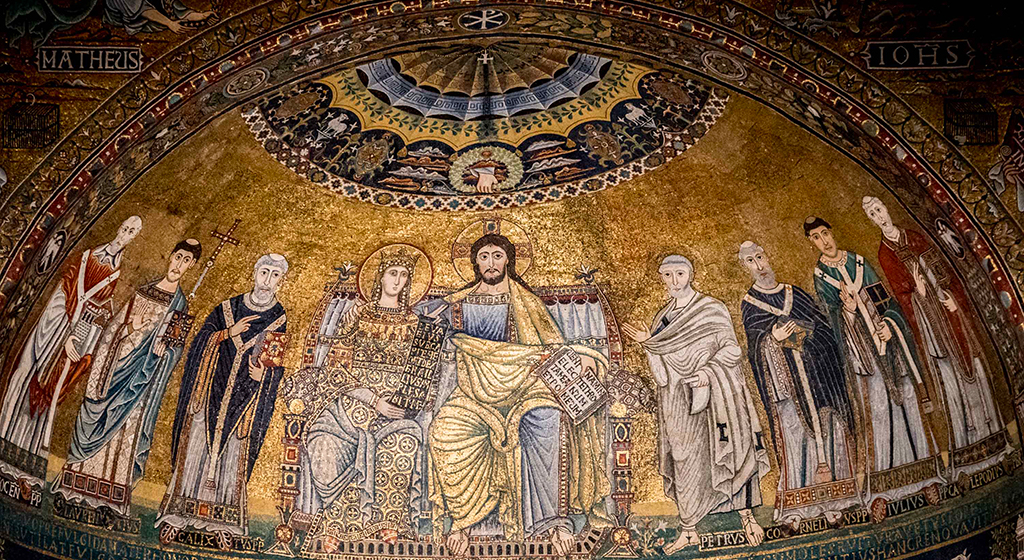Memory of the Church
Reading of the Word of God
Alleluia, alleluia, alleluia
I am the good shepherd,
my sheep listen to my voice,
and they become
one flock and one fold.
.
Alleluia, alleluia, alleluia
Acts 15,7-21
and after a long discussion, Peter stood up and addressed them. 'My brothers,' he said, 'you know perfectly well that in the early days God made his choice among you: the gentiles were to learn the good news from me and so become believers. And God, who can read everyone's heart, showed his approval of them by giving the Holy Spirit to them just as he had to us. God made no distinction between them and us, since he purified their hearts by faith. Why do you put God to the test now by imposing on the disciples the very burden that neither our ancestors nor we ourselves were strong enough to support? But we believe that we are saved in the same way as they are: through the grace of the Lord Jesus.' The entire assembly fell silent, and they listened to Barnabas and Paul describing all the signs and wonders God had worked through them among the gentiles. When they had finished it was James who spoke. 'My brothers,' he said, 'listen to me. Simeon has described how God first arranged to enlist a people for his name out of the gentiles. This is entirely in harmony with the words of the prophets, since the scriptures say: After that I shall return and rebuild the fallen hut of David; I shall make good the gaps in it and restore it. Then the rest of humanity, and of all the nations once called mine, will look for the Lord, says the Lord who made this known so long ago. 'My verdict is, then, that instead of making things more difficult for gentiles who turn to God, we should send them a letter telling them merely to abstain from anything polluted by idols, from illicit marriages, from the meat of strangled animals and from blood. For Moses has always had his preachers in every town and is read aloud in the synagogues every Sabbath.'
Alleluia, alleluia, alleluia
I give you a new commandment,
that you love one another.
Alleluia, alleluia, alleluia
The apostles and priests gathered together in a common assembly in Jerusalem. The narration of Luke makes us understand that the debate in this first Christian was lively. In the midst of "much debate" Peter stood up and spoke. The apostle, with his authoritativeness and frankness, explained that since "early days,' meaning from the beginning, that is before Paul's conversion, the Gospel was directed to all men and women and not only to the Jews. He told the story of his encounter with Cornelius, a Roman and therefore pagan centurion. The apostle told them that the Holy Spirit had descended on the Roman centurion and his family, showing thus that "In cleansing their hearts by faith [God] has made no distinction between them and us." Peter supported the position held by Paul and Barnabas: grace alone, not ritual practice, brings salvation. Paul and Barnabas took the floor and told them about the precious fruits born from their mission among the Gentiles. The miracles that took place thanks to the proclamation of the Word of God among the Gentiles were a confirmation and clear sign of the strength of the Gospel and pointed out the way for the Church to follow. Luke notes: "The whole assembly kept silence, and listened to Barnabas and Paul as they told of all the signs and wonders that God had done through them among the Gentiles." It was not so much the eloquence or the righteousness of doctrine to raise amazement in the assembly rather the narration of the extraordinary fruits of conversion that had followed Paul's and Barnabas' proclamation. At the end of the assembly, James spoke, and referring to Peter's words, defended the legitimacy of Paul's opinion. He said that it is faith in the Gospel that saves, not the Law; it is passionate love that makes the Church grow as an assembly united not by external rules and not even by ritual practices, but by the faith in the Gospel that wants the salvation of all men and women whatever people and nation they might belong.
